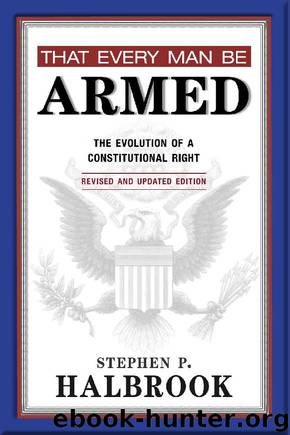That Every Man Be Armed by Stephen P. Halbrook

Author:Stephen P. Halbrook [Halbrook, Stephen P.]
Language: eng
Format: epub
Published: 2014-05-08T18:41:49+00:00
CHAPTER 5
A few days later, Wilson reported his bill to disband the Southern militias,214 but it was not taken up until the next session. The bill read: And be it further enacted, That all militia forces now organized or
in service in either of the States of Virginia, North Carolina, South Carolina, Georgia, Florida, Alabama, Louisiana, Mississippi, and
Texas, be forthwith disarmed and disbanded, and that the further
organization, arming, or calling into service of the said militia
forces, or any part thereof, is hereby prohibited under any circumstances whatever until the same shall be authorized by Congress.215
In response to a request for an explanation of the bill by Senator
Charles R. Buchalew (Democrat of Pennsylvania), Senator Wilson pointed out that “we have evidence of great wrongs perpetrated” by the “local State militia” in those states.216 Buchalew responded: “The organization of local forces for the preservation of order and for defense is one of those ordinary and common rights and privileges, which ought not to be curtailed. . . .”217
Senator Henry S. Lane (Republican of Indiana) justified “dissolving these local militia organizations” because they were not “in harmony with
Government or with the Union sentiment of the country. . . .”218 After Senator Thomas A. Hendricks (Democrat of Indiana) objected that it would amount to “repealing a clause of the Constitution,”219 consideration of the bill was postponed.
When the bill was taken up again a week later, Senator Wilson urged
abolition of the organized militias on the grounds that “in some localities they have been used to disarm portions of the people. . . .”220 Abolition of the militia was vigorously opposed by Senator Waitman T. Willey (Republican of West Virginia) on the grounds that “the militia should at least carry arms to a limited extent. . . . [T]here may be some constitutional objection against depriving men of the right to bear arms and the total disarming of men in time of peace.”221 Senator Wilson, a strong supporter of the Fourteenth Amendment, explained that the militia organizations “go up and down the country taking arms away from men who own arms, and committing outrages of various kinds. . . .”222 But Willey was still unsatisfied because the bill takes the right to bear arms away from every citizen of the southern
States. . . . I should be very willing to favor discriminating
Freedmen, Firearms, and the Fourteenth Amendment
153
legislation that would regulate the use of arms by the militia in the South; but a sweeping enactment of the character that I understand
this to be does not meet my approbation as at present advised.223
It was the argument of Senator Hendricks that the bill would violate the Second Amendment by disarming not only state militias, but also individuals, that carried the most weight in the fate of the bill: I am not able to see how the proposition can be adopted by the
Senate, in view of the second article of the Amendments to the
Constitution, which declares, “a well-regulated militia being necessary to the security of a free State, the right of the people to keep and bear arms shall not be infringed.
Download
This site does not store any files on its server. We only index and link to content provided by other sites. Please contact the content providers to delete copyright contents if any and email us, we'll remove relevant links or contents immediately.
Day by Elie Wiesel(2242)
The Age of Genius by A. C. Grayling(2173)
Gideon's Spies: The Secret History of the Mossad by Gordon Thomas(1950)
The Gulag Archipelago (Vintage Classics) by Aleksandr Solzhenitsyn(1725)
FATWA: Hunted in America by Pamela Geller(1720)
Columbine by Dave Cullen(1495)
Examples & Explanations: Administrative Law by William F. Funk & Richard H. Seamon(1325)
The Rule of Law by Bingham Tom(1318)
Men Explain Things to Me by Rebecca Solnit(1312)
Anatomy of Injustice by Raymond Bonner(1268)
Three Cups of Tea by Greg Mortenson(1256)
ADHD on Trial by Michael Gordon(1238)
That Every Man Be Armed by Stephen P. Halbrook(1236)
Gideon's Spies by Gordon Thomas(1213)
Palestinian Walks by Raja Shehadeh(1141)
The Source by James A. Michener(1133)
Fast Times in Palestine by Pamela Olson(1115)
Nothing to Envy by Barbara Demick(1040)
Constitutional Theory by Carl Schmitt(1034)
